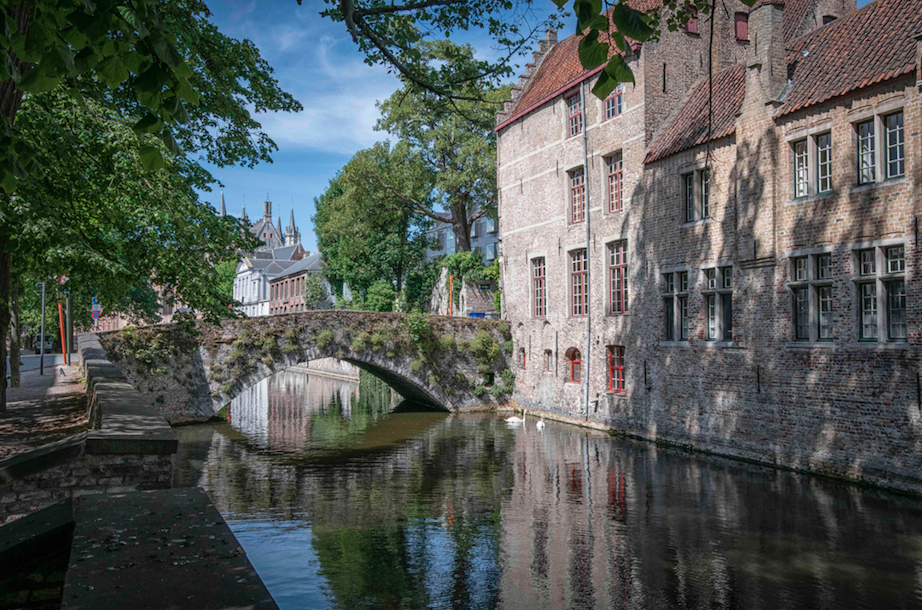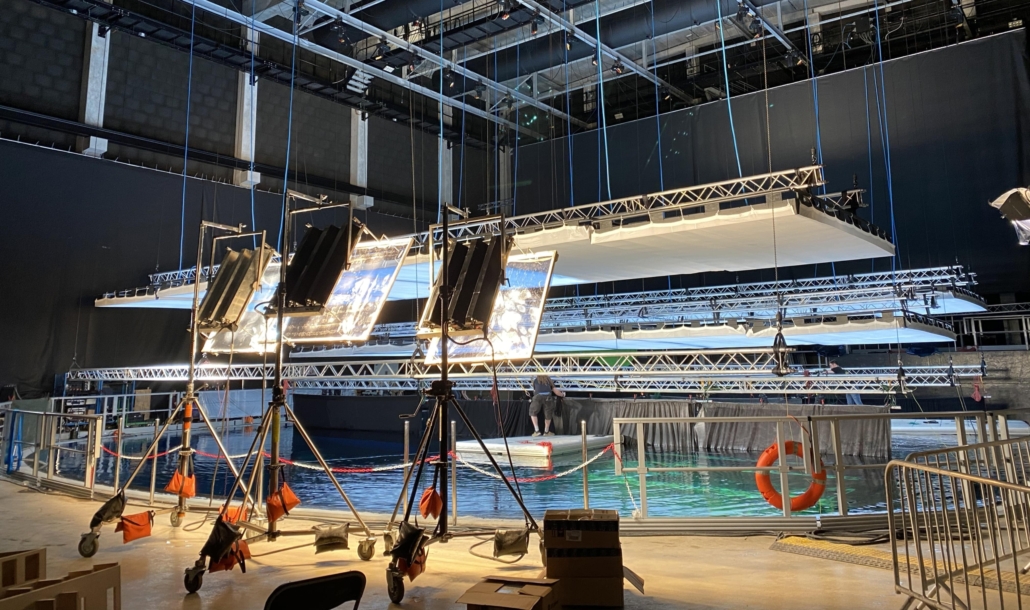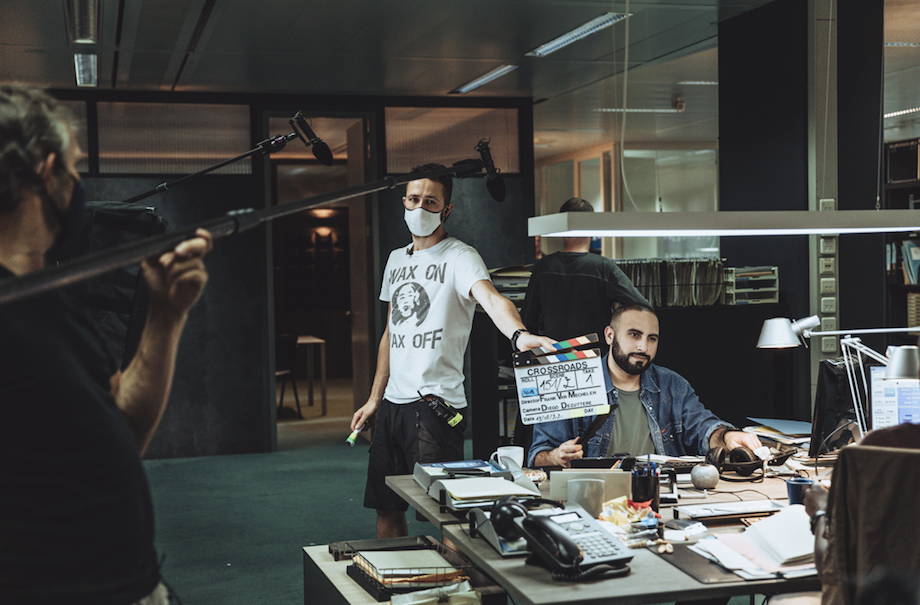EUFCN Spotlight on: Screen Flanders Film Commission
The Film Commission Location Flanders was created in 2008 as a joint initiative of the local film offices of the cities of Antwerp, Bruges, Ghent and Ostend and the promotional agency Flanders Image. In 2012 Location Flanders merged with the newly launched economic fund Screen Flanders and became the Screen Flanders Film Commission.
Jan Roekens, Head of Production at Screen Flanders, presents an overview of recent and future projects in Flanders and the opportunities of filming in a region that offers authentic locations and state-of-the-art studio facilities.

Canals – Bruges © Bea Borgers
Which main productions were shot recently in Flanders?
The Flemish Christmas movie The Claus Family was the first production to start filming after the end of the first Covid-19 wave in Flanders. They followed the established protocols and were able to successfully wrap the production. The family feature directed by Matthias Temmerman tells the story of Jules Claus, who doesn’t like Christmas at all. But a magic snow globe found at his grandfather’s toy shop will change his life forever. The film features a Flemish star cast, including Jan Decleir (Don’t Shoot) and Mo Bakker (Don’t Shoot, Binti). It is produced by the newly-formed production company Dingie and was partly shot in Bruges.
Which productions were interrupted by the pandemic but managed to resume over the summer?
“The French-Belgian drama series L’Opéra, which follows three characters inside the famous Palais Garnier, the temple of French dance. Flemish directing duo Inti Calfat and Dirk Verheye (Over Water, Into the Night) has taken on the first four episodes. Part of the series was shot at Antwerp’s Bourla Theatre, the Ghent Opera House and the Atelier du Théâtre National in Sint-Pieters-Leeuw. Belgian co-producer is Belga Productions.
The underwater horror feature The Deep House by Alexandre Bustillo and Julien Maury. The film tells the story of a couple of photographers set out to explore a haunted house submerged beneath an artificial lake in the middle of the Pyrenees. Radar Productions (France) is the main producer, with Umedia Production Services on board as Belgian co-producer. The underwater scenes were filmed at the LITES state-of-the-art water studio, which also provided the camera equipment. Several Flemish professionals were involved in the production crew.

Set of The Deep House at the LITES Studios ©Screen Flanders
The prime-time drama series The Window, which takes an inside look at elite professional football and the business that surrounds it, also resumed in the summer. The ten-part series is directed by Adrian Shergold, Claudia Garde and Flemish director Pieter Van Hees (Waste Land, Generation B., Versailles III). Filming in Flanders took place in Antwerp, Bruges, Ghent and Schelle. Local acting talents such as Louis Talpe (The Racer), Ella Leyers and Barbara Sarafian are among the supporting cast, while composer Raf Keunen and DOP Richard van Oosterhout are also involved. Velvet Films is the Belgian co-producer.
Actor Jeroen Perceval’s directorial debut Dealer, a drama about a fourteen-year-old drug dealer who gets a famous actor as a customer, with Ben Segers and Veerle Baetens (The Broken Circle Breakdown) in the lead roles, was shot at various locations in Antwerp. Savage Film is the main production company.”
What is set to be shooting in the future?
The following productions have just started filming or will start over the course of the next months:
The French drama series Crossroads created by Flemish screenwriter Paul Piedfort (Professor T), with Flemish director Frank Van Mechelen (Salamander) at the helm. The series is currently filming on location at the Belgian seaside and in the city of Antwerp with a mainly Flemish crew, including professionals such as DOP Diego Dezuttere (Unité 42, My First Highway), art director Max Van Essche (Beau Séjour, Undercover), sound designer Hans Tourné (GR5, Salamander) and head of make-up Gerda Van Hoof (Undercover). Flemish co-producer is Sallie Gardner and Domm.

Covid-19 proof set of the drama series Crossroads ©Sofie Gheysens – FTV – NDF
The second season of the Norwegian drama series State of Happiness which will be directed by Petter Næss (State of Happiness 1) and Ask Hasselbalch (Antboy 3). The series is planned to be partly shot at the LITES water studio in Vilvoorde. Flemish co-producer is Lunanime.
ITV’s remake of the Belgian crime drama Professor T, starring Johnny English’s Ben Miller and Harry Potter and the Goblet of Fire’s Frances de la Tour. The series is produced by Eagle Eye Drama, the production company set up by the founders of foreign language streaming service Walter Presents and the Belgian-based production company Caviar Antwerp. The series will be directed by Belgian director Indra Siera, who directed the original Belgian series, and will be filmed in Belgium and Cambridge.
The TV drama series Transport. The series is written and directed by Auli Mantila from Finland, and produced by Tekele Productions, with Philippe De Schepper and Helen Perquy’s Jonnydepony on board as Flemish co-producer.
The French drama series Renaissances produced for TF1 and directed by Flemish director Frank Van Passel (The Emperor of Taste, Madonna’s Pig) with French actress Claire Keim (Infidèle, Insoupçonnable) and Flemish actor Boris Van Severen (GR5, Baptiste) as part of the cast. Twenty shooting days will take place in Antwerp with a mainly Flemish crew. Belgian co-producer of the series is Belga Productions.”

Handelsbeurs – Antwerp © Bea Borgers
What’s the biggest production you have ever supported in your territory?
“The largest fiction production we have supported with the Screen Flanders Economic Fund was Kursk of the Danish director Thomas Vinterberg, produced by Via Est (LU) and Belga Productions (BE).
The film follows events that unfolded in 2000 after explosions on board of a Russian submarine in the Barents Sea. The film shows the sailors’ fight for survival in the stricken submarine, while their families on land battle political obstacles to save them. The filming took place in the water stage of the AED Studios (this was before the opening of the LITES water stage).”
What are the advantages of filming in Flanders?
“Flanders offers a unique combination of very attractive film financing mechanisms (Tax Shelter and Screen Flanders), authentic locations that can double for 19th Century Paris (Les Misérables) or even medieval England (The White Queen), state-of-the-art facilities (AED Studios and LITES Studios) and internationally renowned talent in front (Matthias Schoenaerts, Veerle Baetens, Matteo Simoni) or behind the camera (Tim Mielants, Jakob Verbruggen, Hans Herbots, Adil El Arbi & Bilall Fallah).”
Les Misérables © BBC
How are you handling the gradual restart of production in Belgium and how do you see the future of the audiovisual industry?
“In order to support the producers affected by the corona crisis and to make it possible for Screen Flanders supported projects to be realised despite the crisis, we launched a set of Covid-19 measures. These temporary measures are amongst others related to the submission of applications, the expenses and expenditure period and the payment of instalments.
Via the film commission we assembled Covid-19 film protocols and sector-specific guidelines and made them available in multiple languages for international producers wanting to shoot in Flanders. Covid-19 on set coordinators were trained, and all studio facilities were equipped to comply with the latest Covid-19 safety standards. Production has been able to resume in safe circumstances.
How we will come out of this crisis as an industry is too early to call.
It is clear that the present situation challenges the existing models in a very profound way. In the short term we have to safeguard our production companies, our suppliers and the AV workforce. Overall, we have to come up with answers to questions about financing (will financing sources disappear, will other become stronger?), actual production (Covid-impacted budgets, safety, ‘corona-insurance’…) and distribution (when and how will theatrical be back?).
It seems that only a vaccine could bring things back to normal. Hopefully that can be the case during the year 2021. But it is to be seen if that new normal equals the normal we used to know.”
The European Film Commissions Network is a non-profit association that supports and promotes the European film industry and culture. It currently represents 98 European film commissions and film institutions from 31 different countries.


